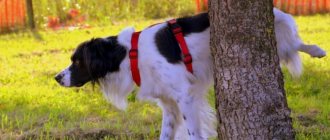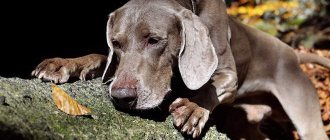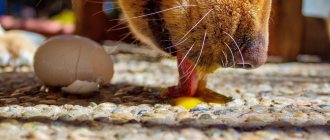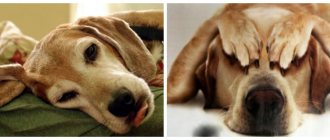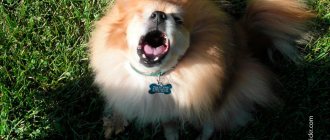Young dogs are the most inquisitive pets. If it is enough for kittens to simply smell an unfamiliar object, then puppies must definitely taste it. But sometimes curiosity persists until a very advanced age.
In such cases, the owner is perplexed for a long time why the dog eats soil on the street or from a flower pot, and sometimes tries to swallow completely inedible-looking stones. There are several explanations for this behavior, and some of them are quite dangerous.
Dogs eat soil: reasons
How can you explain why a dog eats earth and sand?
- Lack of certain vital elements in the body, such as vitamins or minerals. The animal exhibits an instinctive desire to make up for the deficiency.
- Infection with helminths can cause discomfort in the intestines, which the pet seeks to get rid of in any way.
- Attracting the owner's attention when there is a lack of communication. A dog goes against the rules in hopes of spending time with his owner.
- Depression, loneliness or stress often cause psychological disorders, in particular pica, which is the habit of eating non-food items to fill the stomach.
- Uncontrollable behavior that can occur during playtime when a dog or puppy loses control of himself and unknowingly swallows a handful of dirt or stones.
- Curiosity should also not be written off, because young dogs can taste everything unusual and unfamiliar. This is how they get to know the world around them.
- Four-legged friends are sometimes attracted to soil in flower pots. The same reasons work here, but you can add to them the alluring aroma of fertilizers mixed into the soil.
What exactly is the dog missing?
It is not surprising that the owner asks this question, seeing how the dog eats the earth with pleasure. The first thing that comes to mind is a lack of some elements in the body. According to experts, animals most often need to replenish macro- and microelements, more precisely calcium and carbon.
The same diet forces the dog to look for sources of minerals on its own, so they sometimes chew on walls, eat soil on the street or from flower pots. In case of vitamin deficiency, consultation with a veterinarian is required. He will create a complete diet and recommend mineral and vitamin supplements.
If the pet is naturally fed, apples, meat and bone meal, beef tripe, and veal kidneys are introduced into the diet on a daily basis. At the feeding site, two additional bowls are placed: with crushed chalk and wood ash. If the dog appreciates them, it means there really was a deficiency of microelements in the body.
The consequences of such a deficiency can affect the animal's susceptibility to various viruses and bacteria. As a result, metabolism slows down and the body is less able to absorb valuable substances that come from food. At the same time, anemia may develop, and a lack of iron will certainly cause a desire to get it from the outside. This element is present in the soil, which causes the dog to eat it.
Good to know
- What types of breathing problems do dogs have?
- Why does my dog often vomit yellow or white foam? Treatment for vomiting in dogs
- Why doesn't the dog eat anything? Dog won't eat food or food?
- Why does a dog scratch its ears and shake its head? Why does my dog constantly shake his ears?
- What is the reason why a dog constantly whines? When should you contact a veterinarian?
- Why is my dog breathing heavily and frequently? First aid for a dog with difficulty breathing
- Why does a dog eat cat feces? Find out how to correct this bad habit
- Why does a dog drink a lot of water? The main causes of thirst in dogs and tactics for animal owners. What should you do if your older dog starts drinking a lot of water?
- Eye discharge in dogs
- Why does a young dog have bad breath? An elderly dog has bad breath, what should I do?
- Why can a dog lose hair in patches or all over its body? How to treat hair problems in dogs?
- Why does my dog have diarrhea? Dog diarrhea
- How to treat bartonellosis in dogs
- Bordetelosis and Bordetella in dogs
- How to treat adenovirus in dogs?
- Why is the dog lethargic and constantly lying down?
Why is eating soil dangerous?
If you don't stop your pet in time, the addiction to eating soil will turn into a habit. What does this mean for the dog?
- Infection with parasites even after a small portion of soil. Poisoning is possible with consequences for the digestive system, as well as the development of diarrhea or constipation. Particularly harmful are the accumulations of various toxins and poisons in urban soil, which permeate it in the form of precipitation and exhaust gases.
- Blockage or obstruction of the intestine, damage to the mucous membrane of the intestine or esophagus from eaten pebbles, damage to the integrity of the teeth. Death from suffocation is also possible if large pieces become stuck in the throat. To prevent such a scenario, it is necessary to discourage the animal from its atypical addiction as soon as possible.
How to recognize that a dog has worms? What to do about it?
An animal infected with helminths has external signs of infection.
Table 1. Signs of helminth infection
| Signs | Image | Initial degree of infection | First degree of infection | Second degree of infection |
| Loss of appetite | Refuses any of the feedings | Refuses to eat daily | Doesn't eat for several days and refuses water | |
| Pale mucous membranes | Pale mouth | Pharynx gray | Dry and yellow mucous membrane | |
| Weight loss | 5% per week | 10% per week | Up to 15% per week | |
| Wool loses its appearance | Wool becomes dull | Starts to fall out | Falls out in shreds | |
| Digestive disorders | Vomiting and regurgitation | Diarrhea or constipation | Blood and mucus in feces |
What measures to take
When a dog is repeatedly caught eating soil from a flower pot or on the street, it is recommended that instead of panicking, find out the reason and begin taking pre-planned actions. Don't start with yelling and physical punishment.
Recommended measures:
- Review of diet. Inclusion of fresh vegetables and fruits.
- Carrying out deworming. The procedure is repeated after 3 months, regardless of the content. Preventive cleaning is recommended for all pets and family members.
- Treatment of dogs with multivitamin complexes. Selected on the advice of a veterinarian.
- Planting grass at home. The pet will switch gears and forget about the ground.
If, after the measures taken, the animal continues to eat soil, then psychological disorders are to blame. You should contact a veterinary clinic and tell your doctor about your dog’s strange behavior. The results of the examination will indicate the need for appropriate sedatives. A courteous attitude towards your pet plays an important role in restoring emotional imbalance. Joint walks and friendly communication are effective.
While walking, it is better not to let your dog off the leash. This will help to stop the animal in time and prevent another attempt to eat the ground. This question requires consultation with a dog handler.
Answer
Owners of dogs with extremely sharp teeth often encounter this difficulty. In search of an object to sharpen, a dog (puppies often do this) attacks:
- Crushed stone;
- Cement;
- Coal;
- Ash;
- Concrete;
- Sand.
Home furniture is included in the list of damaged items. However, sand, stones and concrete will certainly harm a dog’s stomach, injuring the walls of its organs. Pebbles help birds grind solid food in the stomach; stones are contraindicated for dogs.
Often the dog not only sharpens his teeth, but takes stones into his mouth, sometimes swallowing. For the owner, the phenomenon becomes an alarm bell; from swallowing such things, the dog’s stomach is not in the best condition. If the puppy lacks mineral elements, the dog begins to chew on solids.
If you do not notice the situation in time, the dog’s development will move in the wrong direction.
How to wean
To get rid of a bad habit, you can use a number of manipulations:
- Having caught your pet at the crime scene, scare it away with a sharp clap or scream. Try to remain unnoticed so that the dog does not understand who the offender is.
- Take a ball or rubber toys for a walk. They can distract the puppy, especially during the period when he is teething.
- Arrange joint activities with your four-legged friend. You can play, run, conduct training classes.
It’s good if the dog is accustomed to the commands “No” and “Fu” from an early age. To better master the lesson, each successful completion should be rewarded with a treat. It is important that the dog understands that what is tasty is in the hands of the owner, and not in the ground. Once the reasons for the dog’s inappropriate behavior have become clear, the owner should urgently take measures to wean him from this habit. Do not underestimate the danger of addiction to the health and life of your pet. Remember that your pet's future depends entirely on you.
Unstable psyche
The character traits of each pet are taken into account during diagnosis. But if an active dog, for example, stops following usual commands, does not respond to favorite games, has difficulty concentrating on food (stops eating - goes somewhere - comes up again) - it is precisely this behavior that should alert you. Or a previously calm dog in an enclosure does not find a place for itself, begins to dig holes, tries to escape, and shows aggression.
The diagnosis of hyperreactivity is made if the dog:
- Cannot fully maintain attention on the game.
- Stops obeying the owner's requests.
- Forgets familiar patterns, confuses commands.
- Easily distracted by any external stimuli.
- Unable to sit still or walk nearby.
- Inappropriately aggressive and noisy when walking or playing.
- The usual routine of walking, feeding, and sleeping is disrupted.
A dog's unstable psyche can affect its behavior, as a result of which the dog may begin to eat soil
How often should you visit the veterinarian?
The frequency of visits to the veterinarian should be determined individually, based on the physical condition and age of the dog. There are recommendations for each age, which will be discussed further.
- Dog less than 1 year old: a monthly visit is recommended. It is up to one year that young pets need to have all the necessary vaccinations. The doctor also monitors the development and growth of the dog, whether there are any problems due to a lack of minerals, vitamins, and whether the development corresponds to age. A qualified doctor will definitely draw up a schedule of visits after a thorough examination of your pet. During this period, it is advisable to find a veterinarian who would monitor the dog throughout his life. A kind of family doctor, only for your beloved dog.
- Ages 1-7 years: Recommended annual examination. When the dog is one year old, you need to continue vaccinations according to the previously prescribed veterinary calendar. Don't forget about the annual examination, during which your pet will be thoroughly checked: ears, eyes, nose, heart, lungs, mouth. Only a detailed examination can guarantee the identification of possible symptoms of disease in certain organs. Based on the results of the visit to the veterinarian, recommendations regarding dental care, nutrition, physical activity, etc. will be offered. If there is a suspicion of illness, then additional examinations and tests will be prescribed.
- Ages 8 years and older: Visit your veterinarian every 6 months. Old dogs, like people, are at risk and are more susceptible to various diseases. For this reason, you should visit the veterinarian every six months. In addition to standard examinations, the doctor may prescribe urine, blood, stool tests, x-rays, ultrasound, and blood pressure measurements.
Cases when a trip to the veterinarian should not be postponed
When the dog feels well and no deviations in behavior are observed, it is necessary to visit the veterinarian according to a previously drawn up schedule. However, there are some emergency situations that require emergency assistance from a qualified specialist:
- severe breathing problems are observed;
- the dog was hit by a car;
- the pet does not wake up and is unconscious;
- the dog fell unsuccessfully from a height;
- incessant diarrhea and vomiting throughout the day, pale gums, diarrhea with blood;
- suspected paw fracture or other injury;
- the dog ate something poisonous;
- seizures with convulsions;
- the pet has fallen and does not get up;
- felt a tumor;
- the animal suddenly lost orientation in space;
- the dog whines, hides and trembles;
- other unnatural behavior of the pet.
Dogs eat soil: reasons, what to do
Depressive state
Alarming symptoms of decreased activity, indicating a depressive state of the animal:
- Whines monotonously.
- Refuses to respond to other dogs or goes into conflict for no apparent reason.
- Gets tired quickly and does not respond to the owner's commands.
- Repetitive motor patterns (tail circling, regurgitation of food followed by swallowing).
- Loses neatness skills.
- Not trainable.
Dogs react poorly to changes in family composition, moving, new people in the house, updating the interior or climate. If there are no such reasons for depression, and behavior does not change for a long time, you should look for the source of the problem in diseases of the internal organs, metabolic disorders or endogenous disorders.
Treatment and prevention of depression in dogs
Boredom
Bored dogs can be destructive and behave strangely, such as eating dirt. Always make sure your dog is moving well and socializing frequently to prevent this behavior. Eating something isn't usually the most common result of boredom, but it's not out of the realm of possibility, and we've seen much stranger things.
Make sure your dog has enough toys in the house and garden to keep them occupied even when there is nothing going on at the time. If you leave your dog outside for long periods of time, make sure he is not sitting idle.
